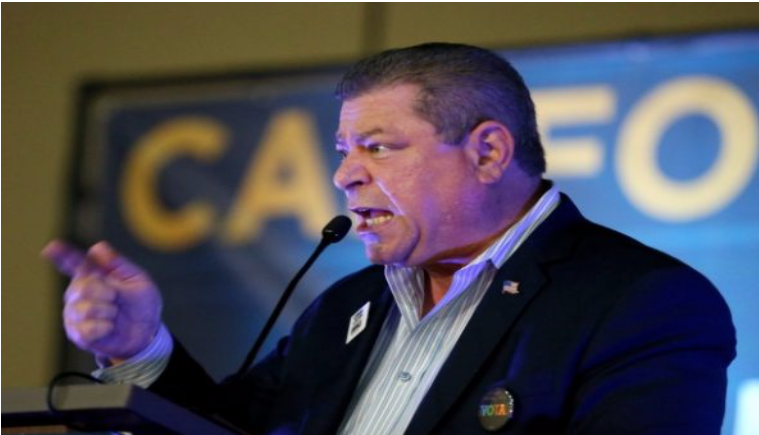CommentsCAL MATTERS-- The resignation of California Democratic Party chairman Eric Bauman comes at a particularly emotional moment in California politics—on the heels of historic wins for Democrats and after a year of bipartisan reckoning over the apparent culture of sexual bullying within the political class.
Bauman became the latest casualty of the #MeToo movement when he resigned Thursday, hours after Gov.-elect Gavin Newsom called on him to step down over allegations that he harassed staff members and party activists with numerous lewd comments and incidents of inappropriate physical contact. Bauman said he has a drinking problem and would seek treatment.
“I have made the realization that in order for those to whom I may have caused pain and who need to heal, for my own health, and in the best interest of the Party that I love and to which I have dedicated myself for more than 25 years, it is in everyone’s best interest for me to resign my position as chair of the California Democratic Party,” Bauman said.
That Bauman’s alleged behavior persisted even as the public gaze focused so heavily in the last year on rooting out sexual harassment may be a testament to the counterproductive role alcohol too often plays in Capitol culture. Or it may point to the declining significance of political parties—how important can a party leader be, after all, if he can decree “zero tolerance,” as Bauman did, for sexual harassment and then openly proceed to harass his staff?
But most of all, Bauman’s resignation is a sign that the #MeToo story is far from over.
“There are a lot of untold stories, and frankly, a lot of bad actors who haven’t been held accountable yet,” said Samantha Corbin, a lobbyist whose public letter last year kicked off the anti-harassment movement in the state Capitol.
During the past year of tumult and introspection, three legislators resigned, facing harassment allegations, and several others were publicly reprimanded for behavior ranging from using vulgar language to giving unwanted “noogies.” On the very day Bauman resigned, the Assembly released records saying Democratic Assemblywoman Cristina Garcia violated sexual harassment policy by acting “overly familiar” with a staffer when, in a drunken state, she grabbed him at a legislative softball game. Throughout this year, the Legislature passed dozens of laws to combat harassment in workplaces statewide, and formed a special committee that crafted a plan to improve the culture inside the Capitol.
Bauman, who is gay, spoke out last year in favor of legislation to give Capitol staffers whistleblower protection if they report misconduct. The Democratic convention he organized in February included new precautions to keep participants safe, such as extra security and a hotline for reporting harassment and assault.
Now Bauman himself will be the focus of an inquiry by a new Commission of Inquiry and Recognition being formed by a Democratic party activist in Los Angeles who says he’s been a victim of Bauman’s inappropriate advances. The commission includes former state schools superintendent Delaine Eastin.
“There is going to be a lot of focus on who enabled this. There are still people in party leadership who enabled this to persist as long as it has,” said Hans Johnson, president of the East Area Progressive Democrats club.
“They are part of the breakdown in governance in the party that contributed to the worsening and widening of the hurt (Bauman) has been allowed to inflict.”
Johnson said Bauman doesn’t deserve credit for California Democrats’ electoral victories this month—which included flipping seven seats in the House, capturing every statewide office and gaining supermajorities (and then some) in both chambers of the Legislature.
Political scientists and campaign strategists agreed that party leadership seemed to be only one factor among many in the blue wave this election. Democrats, they noted, also were buoyed by Californians’ deep dislike of Republican President Donald Trump, as well as a strong push from the Democratic Congressional Campaign Committee and numerous labor and activist groups that raised huge sums of money and organized campaign volunteers.
“The state party did not have a major role in what happened in regards to Congress,” said Sherry Bebitch Jeffe, a retired political science professor at the University of Southern California.
“What the state party is, by and large, is a way for donors to launder money,” she said, because the law limits how much they can give to individual candidates but not how much they can give to the state party.
The party hired an employment lawyer to investigate the accusations against Bauman. That process will continue despite his resignation, said acting-Chair Alexandra Gallardo Rooker, and an executive summary of the findings will be made public.
Rooker will continue to serve as the party chair until delegates elect a new leader, likely at their convention in May. What’s not clear, however, is how many more political figures will fall before the #MeToo story is over in California.
(Laurel Rosenhall writes for CalMatters … where this analysis was first posted.)
-cw
















